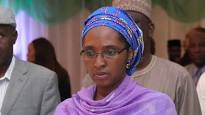The Minister of Finance, Budget and National Planning, Mrs. Zainab Ahmed, on Monday hinted that the Federal Government would unveil a 30-year development plan before the end of the implementation of the ERGP in 2020 as part of the measures to achieve broad-based and sustainable national development.
She explained that unlike past development plans that had five-year lifespans, the new plan would have between 20 and 30 years span and focus at ensuring the attainment of the national development goals and the targets.
Noting that despite the robust goals and targets set in previous development frameworks such as the Visions 2000, 2010, 2020, not much had been achieved in terms of the set targets, adding that this calls for a new approach in national development plans.
Ahmed said: “Shifting gears emphasizes the imperative for the country to move to a more robust competitive private sector economy while discussing the implication of the projected population of the country hitting over 400 million by 2050 with 65 per cent of them under the ages of 35 years.
“In this regard, it is only a competitive private sector-led economy that will drive this process and ensure economic prosperity for all Nigerians”, she added
The minister, while fielding questions from journalists after her briefings on the Nigerian Economic Summit Group (NESG) Summit scheduled to hold next month in Abuja, said that the failure of government to holistically implement the recommendations of the NESG over the years was partly responsible for the non- attainment of the nation’s development goals.
She, therefore, assured that in order to improve the efficiency of the nation’s economy and its growth, government would henceforth commit itself to the implementations of recommendations by the group on yearly basis.
The minister promised: “Henceforth, all recommendations of the NESG would be presented to all stakeholders, namely the Federal Executive Council (FEC), the National Council of State and the relevant committees of the National Assembly so that they can be implemented country-wide.’’
Meanwhile, the minister explained further that government was not eager to adjust the crude oil benchmark used for the 2020 budget, despite the past days surge in oil prices from $56 to about $71 per barrel as a result of attacks on Saudi Arabia’s oil facilities.
While describing the development as worrisome, Ahmed noted that if a Saudi Arabia with sophisticated security system could suffer attacks, then countries like Nigeria might be vulnerable
The Federal Executive Council (FEC) had at the end of its meeting last Wednesday decided that the 2020 Appropriation Bill would be predicated oil production of 2.18 million barrels per day fixed at $55 per barrel.
In the 2019 budget, the benchmark was 2.3mbpd output and the price fixed at $60 per barrel.






